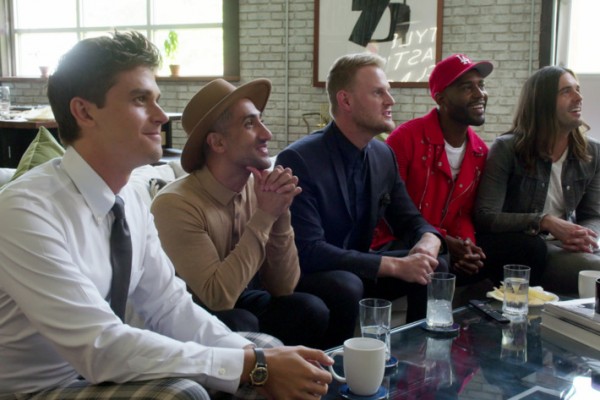Is 'Queer Eye' an Effective Antidote for Trumpism?
by EG

Queer Eye is definitely a hit for Netflix, but is its message of inclusion and compassion making a difference in an America besieged by divisive politics?The show's creator has some thoughts on that topic. Read on to find out about them.
Fourteen years after it became one of the first reality shows (then a fledgling genre) to win an Emmy, Queer Eye again finds itself in awards contention — this time for its surprisingly well-received Netflix revival that has earned a flood of praise (and tears) for the new cast's open-minded makeovers in red-state America. "I feel humble every day to realize this little idea from 15 years ago is having a real impact right now," says creator David Collins, 51, who partnered with David George's ITV America to reboot the long-dormant format at the streaming giant. "It means the world to me."
Collins, on the ground in Kansas City, Missouri, to film a fast-tracked third season, caught up with THR to talk about his series' evolving identity, shooting in Trump's America and how — contrary to what some Twitter skeptics may believe — food expert Antoni Porowski really can cook.
Can you talk a little bit about the move to the Midwest, where you're shooting now after filming the first two seasons in Atlanta?
The welcome mat of Kansas City has been more than anything I've ever seen in my 30-plus years of doing this. They've welcomed us into the city, showed us the towns and the locations. We could not be happier. And why the Midwest? I'm a Midwestern kid. I was born and raised in Cincinnati. Honestly, I think [this region] was the next step. We looked at all kinds of cities along the way. But we really realized that this is the heartland.
Do you see the show moving around more in future seasons?
The show found its legs down south, where we got to see people with different points of view and opinions. Those conversations wouldn't have happened in New York City or Los Angeles. We're really into exploring and letting these guys come into different cities and towns and have their own personal experiences as well. That's part of the beauty to each city that we go to.
You and the cast have acknowledged that this iteration of the show has raised the bar in terms of representation and the kinds of conversations being had. Looking back, do you wish you'd been able to do more with the first show?
The O.G. Fab Five were trailblazers. We got to see real gay men for the first time in real situations. Fifteen years ago, the world was not ready to hear Carson [Kressley] saying that he had a boyfriend or Thom [Filicia] say that he was married. I think America probably would have really rejected the show. Timing is everything. The reason that the show is working again now is that it's time for a healthier dialogue, a deeper dialogue. The first show had its time, and it did exactly what it was meant to do.
We've been talking about that a lot in all our creative production meetings. We obviously have a format. That's what works. We know the beginning, the middle and the end and how all of those elements are put together. But we also know that the reason the show works is that we're really trying to stay true to the experience that happens over the five days. It's about being flexible. What we are shooting right now is very different from anything we've done, and you never know what's going to work. But why not try? The Skyler [Jay, Queer Eye's first transgender participant] episode started with his top surgery. Viewers are able to watch and realize, "Wow, what is going on here?"
Get the rest of the story at The Hollywood Reporter.
Are you a fan of Queer Eye? Tell us about it in the comments below.